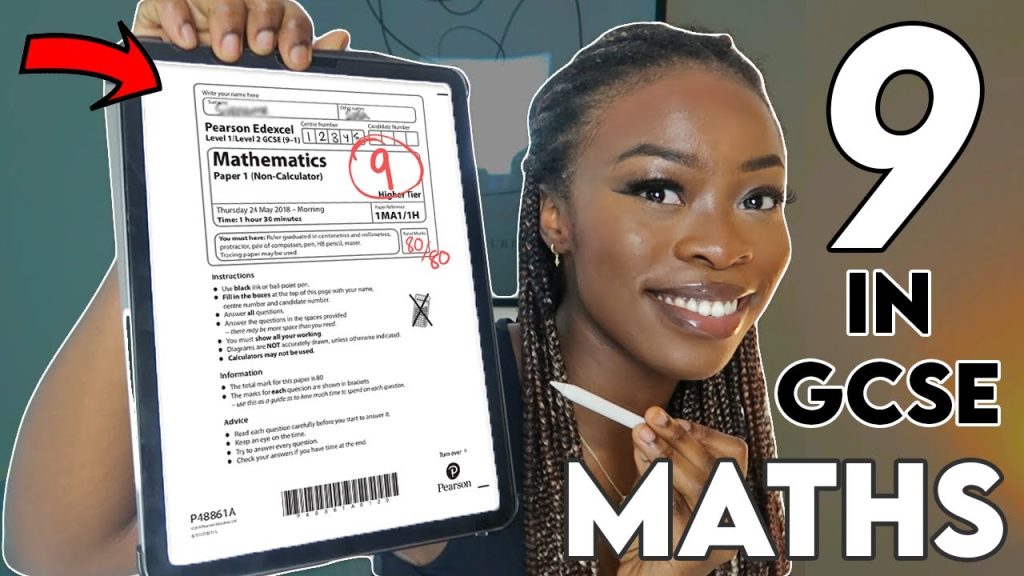Imagine walking into your GCSE Maths examination armed with knowledge from a high-scoring dental scholar. “Maximizing GCSE Mathematics Success: Insights from a Top Scoring Dental Student” is here to support your preparation journey. This eye-opening video stems from the experiences of a second-year dental student who achieved the remarkable score of grade 9 in GCSE Mathematics back in 2018. She knows what it’s like to struggle with Maths; she’s been there and found the road to success.
Understand why you’ve been losing marks, key strategies to ace the exam, and the importance of consistent practice even when it feels hard – these are some of the knowledge gems shared in the video. Get insights into the importance of focusing on your weaker areas rather than over-repeating what you’re already comfortable with. The video emphasizes the need to avoid careless errors by thorough checking and realistic answer verification. This is not just another resource review, but a winning game plan drawn from a student’s own successful experience.



Understanding the Importance of GCSE Mathematics
GCSE Mathematics is not merely an academic subject, it’s a vital part of your educational journey with broader implications. Understanding its significance helps you approach your studies with the right attitude.Significance of Mathematics in Education and Careers
The wisdom resides not just in solving complicated equations, but in the logical thinking and problem-solving aptitude it instills in you. Mathematics develops your skills in reasoning, creativity, decision-making, and strategic thinking which are highly sought-after qualities in numerous career paths ranging from engineering, technology sectors to finance and economics.Impact of High Scores on Future Opportunities and Confidence
Achieving high scores in GCSE Mathematics can open gates for various advanced academic opportunities including ‘A’ levels in Mathematics, Further Mathematics and scientific disciplines, not to mention it is a stepping stone towards attending reputed universities. In addition, high scores also boost your self-confidence and establish a positive trend for future academic successes.Relevance of GCSE Mathematics in Pursuing Dentistry
You might wonder the relevance of GCSE Mathematics if you plan to pursue Dentistry. Indeed, the clinical fields involve comprehensive knowledge of human biology, but professionals also require sharp analytical thinking and problem-solving skills to diagnose and develop treatment plans. High scores in GCSE Mathematics thus add immense value to your dentistry career goals.Identifying Common Reasons for Losing Marks
One of the steps towards improving your grades involves understanding the common reasons for losing marks and devising strategies to overcome them.Common Pitfalls in GCSE Mathematics
Mistakes can occur due to lack of understanding, confusion about concepts, or simply misinterpreting the questions. Knowing the common pitfalls helps you be vigilant of these traps, thereby reducing errors.Importance of Understanding the Questions
Understanding the question is crucial. By reading and interpreting it carefully, you ensure a correct approach towards the solution. A key tip is to underline key aspects of the question to avoid diverting from the actual problem.Avoiding Silly Mistakes through Careful Checking
Very often, students find themselves losing marks due to silly mistakes. Through thorough checking of each step of your solution, you can avoid such errors. Consistently dedicating a few minutes to revise your work before submission can save several marks.Effect of Lack of Preparation on Scores
Confusion or inability to understand a question signifies inadequate preparation. Regular practice exposes you to a variety of questions and scenarios, improving your problem-solving speed and accuracy.
Effective Study Methods for GCSE Mathematics
Effective strategies are essential for attaining success in any subject, especially when it comes to GCSE Mathematics.Understanding Active Learning
Active learning involves strategically engaging with study materials instead of simply reading or memorizing them. It aids deeper understanding and consolidation of concepts in your memory.Usage of Flashcards and Mind Maps
Using flashcards for formulas or principles and Mind Maps to visualize complex concepts facilitates comprehension and recall. These tools also make revision efficient and targeted.Managing Time for Daily Practice
Allocating a specific time for Mathematics daily ensures regular practice which is the key to mastering the subject. Early morning hours are often recommended due to the fresh state of mind leading to effective learning.Tackling Different Types of Questions and Problems
Your practice must include various types of questions and problems. Familiarizing yourself with a wide range of scenarios prepares you for anything that comes up in the exam.Adopting Consistency in Study Habits
Studying Mathematics requires consistency. Unlike some subjects, cramming last minute simply won’t work. Regular revision helps maintain a steady progress and reduces exam stress.Setting Goals for Enhancing Performance
Setting realistic, specific and time-bound goals brings focus to your preparation. It adds a sense of purpose to every study session, thereby enhancing your performance.Importance of Well-being and Motivation in Study Methods
Your mental well-being plays a crucial role in academic performance. Regular breaks, healthy meals, and adequate sleep should not be compromised for continuous studying. Stay motivated and inspired by your goals and the opportunities that high scores can unlock.Leveraging Study Resources
There’s an array of resources available for GCSE Mathematics revision. Leveraging these can be immensely beneficial in brushing up your skills.Utilizing Pearson Revision Guides and Flashcards
Pearson guides are renowned for their comprehensive yet concise delivery of the syllabus. They serve as quick references for revision and offer an efficient way to target your weak spots.Following Grade9Series for Regular Revision
Grade9Series presents a well-devised routine to follow along with your revision. It aids in systematic preparation, therefore facilitating thorough learning and better recall.Benefitting From Corbett Maths for Daily Practice Questions
Corbett Maths is a recommended platform for practicing five different questions each day. Regular exposure to a mix of questions polishes your skills and prepares you for diverse problems.Role of Textbooks and Online Resources in Learning Process
Textbooks are fundamental resources that cover the entire syllabus systematically. Online platforms and video tutorials are digital aids that offer flexible learning, practice papers, and interactive problem-solving techniques.
Utilizing Study Schedules Optimal Performance
Creating a structured study routine can maximize your productivity and maintain a healthy balance.Recommended Time for Revision
Designate daily portion of your time specifically for Mathematics revision, preferably early in the morning. This ensures uninterrupted and effective learning.Importance of Early Morning Studies
Morning hours are golden when it comes to studying. With a fresh and active brain, your absorption capabilities are at their peak ensuring optimal understanding and retention of concepts.Adapting Schedules for Difficult Topics
Every student has specific topics which they find tricky. Dedicate more time to such topics in your schedule. Regular exposure to these will gradually improve your understanding and performance.Balancing Study Schedule with School Routine
Find a balance between school, revision, and relaxation in your daily routine. Excessive studying can lead to burnout and hamper your progress.Understanding the GCSE Mathematics Syllabus and Exam Pattern
To strategize your studies effectively, thorough understanding of the syllabus and exam pattern is key.Familiarizing with the Syllabus
A thorough review of the syllabus ensures that you do not miss out on any topic. It forms the basis for planning your study schedule.Understanding the Exam Pattern
Every examination has a specific pattern. Understanding the question types, marking scheme and pacing yourself as per the total duration of the exam can greatly enhance your performance.Relevance of Different Exam Boards
Different exam boards have slightly varied specifications. Being aware of your exam board’s requirements and tailoring your studies accordingly is integral to your success.Importance of Subject-Specific Guides
Subject-specific guides offer targeted material aligned with your syllabus. Their usage enhances understanding and allows efficient revision.Maximizing Use of Past Papers and Mock Exams
Practicing past papers and mock exams provides a preview of the actual exam and helps identify potential weaknesses.Use of Past Papers for Understanding Question Trends
Past papers allow you to familiarise yourself with different types of questions, difficulty levels and trends over the years. Practicing these under exam conditions improves your speed, accuracy and confidence.Benefit of Mock Exams in Simulating Exam Scenarios
Mock exams simulate the real exam scenario, helping you adjust to the pressure and timing. Regular practice of mocks minimizes exam-day stress and surprises.Reviewing Solutions and Mistakes from Past Papers
Reviewing solutions to your mistakes is a productive way of learning. It helps avoid recurrence of mistakes and deepens your understanding of the topic.Choosing to Study in Groups Vs Solo
Both choices have their own pros and cons and should be chosen based on your learning style.Benefits of Study Groups
Studying in groups can enable knowledge exchange, collaborative problem-solving and is motivating. It can make learning fun and engaging leading to better retention.Advantages of Individual Study
Individual study offers flexibility, allows you to move at your own pace and concentrate better. You can customize your study plan as per your strengths and weaknesses.Deciding Based on Learning Style
While some students learn better in groups, others find individual study more fruitful. Choose a method that suits your unique learning style.
Engaging with Tutors and Genuine Feedback
Engagement with tutors and feedback plays an instrumental role in progress and improvement.Benefiting from Experienced Tutors
Experienced tutors can provide the right guidance, clarify doubts and offer helpful insights. They can help you navigate tricky topics and suggest effective problem-solving strategies.Understanding the Importance of Feedback in Improvement
Feedback highlights your strengths and weaknesses. Constructive input helps you pinpoint areas of improvement and evolve your study techniques for the better.Choosing the Right Tutor and Accepting Constructive Feedback
Choosing a tutor who complements your learning style and needs is important. Furthermore, being open to constructive feedback and implementing the learning points effectively aids improvement.Conclusion
By using effective strategies and resources, honing your study habits, and staying motivated, you can attain and even exceed your GCSE Mathematics target.Summary of Insights from a Top Scoring Dental Student
These tips and strategies have been shared by a successful dental student who had scored a grade 9 in GCSE Mathematics. It was through consistent practice, employing effective resources, and setting smart goals that she managed to achieve this feat.Final Tips for GCSE Mathematics Success
Embrace the challenges that Mathematics brings and remember that making progress, no matter how small, is a step in the right direction. Regular revision, practice, exposure to diverse questions and a positive attitude can work wonders.Importance of Continuous Practice and Positive Mindset
Remember, mastery over Mathematics is a journey, not just a destination. Continuous practice and a positive mindset to learn from mistakes and improve are your best partners in this journey. Believe in your capabilities and keep smiling, just like our dental student. Good luck with your Grade 9 aspirations in GCSE Mathematics!Talk with teacher about helping your child with English, Maths, Science or 11 plus.

Tagged Academic Success, Career Guidance, College Prep, Educational Resources, Educational Technology, English Skills, English Tutoring, Exam Preparation, Exam Strategies, gcse, Homework Help, Language Learning, Learning Disabilities, Math Mastery, Mathematics, Maths Tutoring, Online Tutoring, Parental Guidance, Reading Strategies, Remote Learning, Scholarship Opportunities, Science Explorations, Science Tutoring, STEM Learning, Student Motivation, Study tips, Summer Learning, Test Preparation, Time Management, Tutoring Techniques, Writing Techniques



